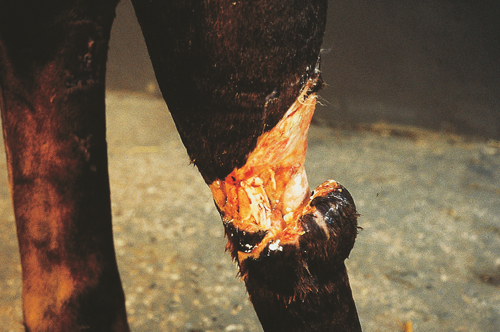Difference between revisions of "Equine Orthopaedics and Rheumatology Q&A 11"
Jump to navigation
Jump to search
Ggaitskell (talk | contribs) |
|||
| Line 16: | Line 16: | ||
|a2= | |a2= | ||
Lameness, together with loss of extensor function in the distal limb revealed by the horse being unable to extend the fetlock. | Lameness, together with loss of extensor function in the distal limb revealed by the horse being unable to extend the fetlock. | ||
| − | |l2= | + | |l2=Extensor Tendon Injury#Clinical Signs |
|q3=Is treatment likely to be successful? | |q3=Is treatment likely to be successful? | ||
|a3=Most horses regain extensor function with conservative management. Even injuries as severe as this will recover eventually with careful, assiduous nursing. <br><br> | |a3=Most horses regain extensor function with conservative management. Even injuries as severe as this will recover eventually with careful, assiduous nursing. <br><br> | ||
Sequestration of superficial dorsal metatarsal bony cortex may occur at 2–3 weeks post injury. | Sequestration of superficial dorsal metatarsal bony cortex may occur at 2–3 weeks post injury. | ||
| − | |l3= | + | |l3=Extensor Tendon Injury#Treatment |
</FlashCard> | </FlashCard> | ||
Revision as of 23:40, 3 August 2011
| This question was provided by Manson Publishing as part of the OVAL Project. See more Equine Orthopaedic and Rheumatological questions |
An 11-year-old eventer injured the dorsal aspect of its right hock on a wire fence.
| Question | Answer | Article | |
| What important structures do you think have been damaged? | The long digital extensor tendon has been completely severed. The periosteum has been stripped off the dorsal surface of the third metatarsus.
|
Link to Article | |
| What clinical signs are likely to be present? | Lameness, together with loss of extensor function in the distal limb revealed by the horse being unable to extend the fetlock. |
Link to Article | |
| Is treatment likely to be successful? | Most horses regain extensor function with conservative management. Even injuries as severe as this will recover eventually with careful, assiduous nursing. Sequestration of superficial dorsal metatarsal bony cortex may occur at 2–3 weeks post injury. |
[[Extensor Tendon Injury#Treatment |Link to Article]] | |
